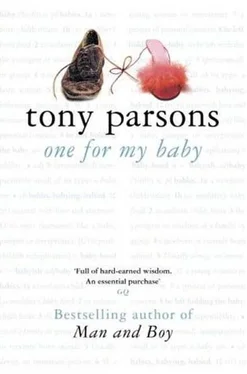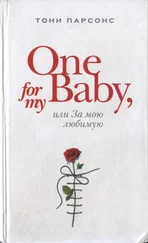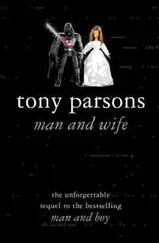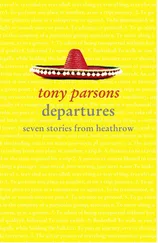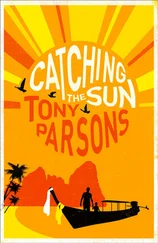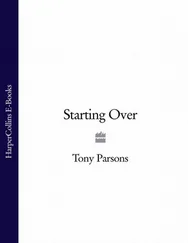“What’s Towering Inferno?”
“It’s the seventies night they have at Club Bongo Bongo. You don’t keep up, do you?”
“I’m trying.”
“Don’t bother. It’s exhausting. She says she’s not having sex with this guy. She says he is just giving her a futon in his living room until she gets settled. Until she can find a place of her own.”
“You don’t believe her.”
“There’s no such thing as a free futon.”
For a moment I glimpse the world restored. I see Lena finding true love on that futon in Wimbledon. I imagine my father begging my mother to take him back, and her eventually relenting. And I glimpse a future where my mother is happy in her garden, my father is writing his brilliant, bestselling follow-up to Oranges for Christmas in his study and my nan never has to go back into hospital to have her lungs drained.
Then my old man spoils everything.
“I’ll get her back,” he says, and it takes me a few seconds to realize that the mad bastard is not talking about his wife or his mother. “I mean, I ask you-a futon in Wimbledon. She’ll see sense in the end. I know she will. And I just can’t live without her. Does that sound stupid, Alfie?”
No, I think.
That sounds like trouble.
If I have a Tai Chi lesson after work I eat an early dinner with the Changs at the Shanghai Dragon.
The Changs eat around six, after Diana and William have had their daily lesson and before the restaurant is open for business. These children study something almost every day, violin for Diana, piano for William, Wing Chun Kung Fu and Cantonese for both of them. It feels like they are either eating or being educated.
The food the family eats bears little resemblance to the menu of the Shanghai Dragon. It is plainer, fresher, fiercer. Nothing is drowned in sweet and sour sauce, nothing is wasted. Tonight we are eating steamed fish, served whole, the head and tail intact, the fish eyes glistening blankly, with plain boiled rice and lots of vegetables-bean curd, baby corn, bean sprouts, Chinese cabbage and mushrooms.
Our plastic chopsticks clatter and clack as we decimate the fish, our heads dipping to greet the bowls of rice, which is shoveled into our mouths with noisy abandon. The Changs wash down their meal with tea or tap water, although they insist that I drink mineral water, fetched from the Shanghai Dragon’s tiny bar.
“It soon New Year,” Joyce tells me.
“New Year?” We are near the end of January.
“Chinese New Year. Very important for Chinese people. Like Christmas and Easter for Westerners. When I little children size, we don’t even think of Christmas. We don’t care for toys. We don’t care about Ken and Barbie going to the disco. Only Chinese New Year.”
“It’s based on the lunar calendar, right? When is it this year?”
Joyce confers with her family in Cantonese.
“New Year’s Eve, February fifteenth,” she says.
“It’s going to be the Year of the Rabbit,” William tells me in his pure London accent, his mouth full of noodles.
“We have party,” Joyce says. “Here. Shanghai Dragon. You come.”
“Can I bring someone?”
“Bring someone? Of course. Bring everyone. Bring your family.”
My family? That’s easy for Joyce to say.
This simple certainty about family is the thing that I envy most about the Changs. Joyce and George and Harold and Doris and Diana and William all know exactly what their family looks like.
But I am finding it increasingly hard to know where my little broken family begins, and where it ends.
O N THE DAY THAT MY NAN is discharged from the hospital, I am meant to be giving Jackie Day an English lesson.
When I arrive home from doing my nan’s shopping, a fistful of supermarket bags in my hands, Jackie is already waiting for me on the doorstep, her daughter by her side. The lump silently contemplates me from behind her greasy brown fringe.
“Jackie-sorry I’m late, I tried to call you.”
“My battery’s flat.”
“I had to do some shopping for my grandmother. There’s nothing in her flat. She just got out of hospital a few hours ago.”
“Well, that’s good.”
“But now I’ve got to take this stuff round to her.” I apologetically lift the heavy supermarket bags. A packet of jam tarts falls out and Jackie retrieves them for me. “I’ve got my mum’s car. So I can’t give you a lesson.”
“I’ll take her shopping round for you.”
The lump has spoken. Her voice is surprisingly high-pitched and girlish.
“What?”
“I’ll take it. If you tell me where she lives. I’ll get the bus.”
I think about it for a moment. Why not? She wouldn’t do in my grandmother for her jam tarts. Would she?
“Would you?” I say.
“Sure. Haven’t got anything better to do, have I? And you don’t exactly need me here, do you?”
“That’s really sweet of you, darling,” says Jackie.
“It’s not far,” I say. “I’ll give you the address and get you a taxi.”
“I can get the bus.”
“I’ll get you a cab.”
I realize, to my shame, that I do not even know this child’s name. Jackie saves me.
“Thanks, Plum,” she says.
Plum?
“Yes,” I say. “Thank you, Plum.”
She shuffles her feet, stares at the ground through her protective fringe, doesn’t know what to do with her hands.
“No problemo,” mutters Plum.
When we have called a taxi and Plum has been packed off with my nan’s address and provisions, I make a cup of tea.
“So,” I say. “You named your daughter after a fruit?”
“Don’t make fun of her.” But she doesn’t say it angrily. She says it almost gently, as if I am too stupid to know any better. “She gets enough of that at school. People making fun of her, I mean.”
“She gets bullied?”
“What do you think?”
“I don’t know.” I manage to stop myself saying-she’s a big girl, I wouldn’t fancy meeting her up a dark alley. But I rephrase the statement in my head. “She looks like she can stand up for herself.”
“She’s a lamb,” Jackie says, and I am touched by the undisguised and unembarrassed affection in her words. “I know she’s a bit overweight, but she’s as soft as they come. And kids can be cruel, can’t they?”
“They certainly can.”
“They pick on anyone that’s a bit different.”
“They certainly do.”
“And for your information, I didn’t name my daughter after a fruit.”
“No?”
“No. I was in my doctor’s waiting room when I was pregnant and I picked up this glossy magazine. You know the kind of thing. Full of glamorous parties and famous people inviting you into their lovely homes.”
I know the kind of thing.
“And there was this sort of society page. Full of beautiful people having a rare old time. Not that all of them were beautiful. Under their suntans, you could tell that some of them were-what’s the word?”
“Ugly?”
“Yes, ugly. Especially the men, who tended to be a lot older than the women. But even though they weren’t all beautiful, they all looked happy. You know what I mean?”
“I guess so.”
“And there were these two girls. Now they really were beautiful. Models, they must have been. Or actresses or something. Or the daughters of rich men. They looked like sisters, but they weren’t. Blond, tall, tanned. Wearing dresses that were like little slips. The kind of dress that looks like you could sleep in it. They were smiling. White teeth. Leggy. What do you call those special glasses for champagne? The long, thin ones?”
“Flutes.”
“Flutes. They both had these flutes of champagne in their hands. I mean, I guess it wasn’t Spanish cava or Asti Spumante, right? They had their arms around each other. These long, thin, brown arms. And what I thought about them was-they looked as though nothing bad had ever happened to them in their lives. Nothing bad. Ever. And the funny thing is, they were both called Plum.”
Читать дальше
